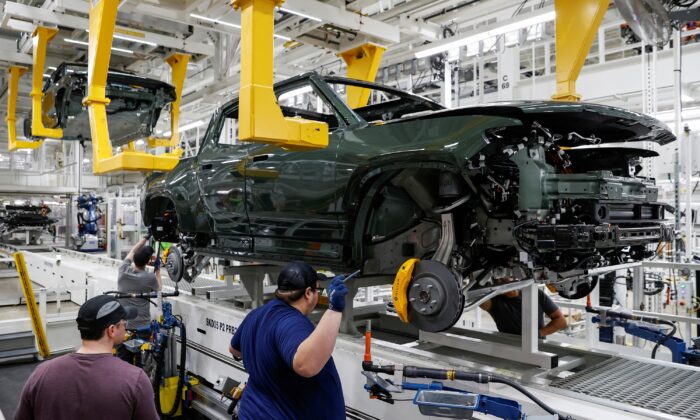‘This loan would enable Rivian to more aggressively scale our U.S. manufacturing footprint,’ Rivian CEO RJ Scaringe said.
Electric vehicle (EV) manufacturer Rivian said on Nov. 26 that it has received conditional approval for a loan of up to $6.6 billion from the U.S. Department of Energy (DOE) to build a factory in Georgia.
Rivian, founded in 2009, plans to manufacture sport utility vehicles and hatchbacks at its new factory in Stanton Springs North, near the Atlanta-area city of Social Circle, Georgia.
The company said that while a conditional commitment reflects the department’s intent to finance the project, “certain technical, legal, environmental, and financial conditions” must be satisfied before the DOE funds the loan.
If the DOE and Rivian sign a contract, the agreement will be binding and in effect before President-elect Donald Trump’s Jan. 20, 2025, inauguration.
The company plans to build the facility in two phases, each with an annual production capacity of 200,000 units or vehicles. This would allow Rivian to service both the domestic and international EV markets, creating new jobs in the Atlanta metropolitan area. Stanton Springs is less than an hour’s drive from downtown Atlanta.
The first phase is expected to start production in 2028.
“This loan will help create thousands of new American jobs and further strengthen U.S. leadership in EV manufacturing and technology,” Rivian founder and CEO RJ Scaringe said in a Nov. 25 statement. “This loan would enable Rivian to more aggressively scale our U.S. manufacturing footprint for our competitively priced R2 and R3 vehicles that emphasize both capability and affordability. A robust ecosystem of U.S. companies developing and manufacturing EVs is critical for the U.S. to maintain its long-term leadership in transportation.”
While Republicans have largely opposed using federal money to promote electric vehicles, the project would bring billions of dollars of investment to an area represented by Rep. Mike Collins (R-Ga.). Trump has opposed EV tax incentives, suggesting that they force car makers to build EVs that consumers don’t want. The Alliance for Automotive Innovation trade group asked the president-elect not to roll back those incentives in a November letter.
“During the campaign you stressed the importance of the auto industry to the country’s global competitiveness and your belief that American consumers must always be able to choose a vehicle that is right for them and their family. We agree,” the trade group’s president and CEO, John Bozzella, wrote in the letter. “These incentives have: fueled investment in domestic EV and battery manufacturing and increased good-paying jobs in automotive communities across the industrial base. The incentives help ensure the U.S. continues to lead in manufacturing critical to our national and economic security.”
The tax incentives and discounts have boosted sales of EVs, with the market growing by 11 percent year over year in the third quarter of 2024, according to the research fcompany Cox Automotive.
“While year-over-year growth has slowed, EV sales in the U.S. continue to march higher,” Stephanie Valdez Streaty, director of industry insights at Cox Automotive, wrote in a statement. “As more affordable EVs enter the market and infrastructure improves, we can expect even greater adoption in the coming years.”
The federal government has offered consumers tax credits of up to $7,500 designed to ensure that at least 50 percent of all cars sold by 2030 are electric. Roughly 9 percent of all cars sold this year were EVs.
The new Rivian plant has been on hold since March as the company faces financial struggles. Backed by Amazon, Volkswagen, and other investors, Rivian would begin producing cars at the Stanton Springs North facility by 2028. Roughly 2,000 people would be employed during the plant’s construction. When completed, it is expected to create 7,500 operations jobs, the company said.
Previously, the Obama administration loaned $465 million to Tesla to fund the production of its Model S electric vehicle. Three years later, Tesla repaid the loan ahead of schedule.
Tesla CEO Elon Musk now opposes tax credits and subsidies for EV manufacturers.
“In my view, we should end all government subsidies, including those for EVs, oil and gas,” Musk wrote in a Nov. 14 post on social media platform X.

